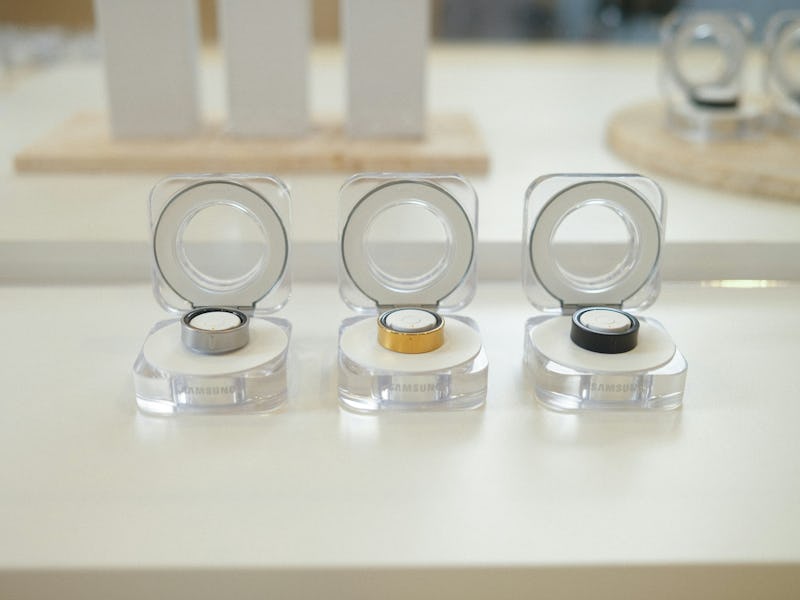Why Samsung’s Galaxy Ring Could Change Your Mind About Wearables
I've never been a smartwatch kind of guy, but a ring is a whole different story.

I’m not a smartwatch guy. That’s not a knock on the Apple Watch or its ilk, or anyone who wears one. But for me, there are (to put things in divorce terms) some irreconcilable differences.
But I’m a modern man, after all, and just because smartwatches and I don’t vibe on the level needed to tie the knot doesn’t mean they don’t do lots of things that I like. If only I — a definitive hater — could cherry-pick the stuff that I do like and leave the rest behind. If only there was...
The Galaxy Ring
I might not be a smartwatch guy, but rings? That’s a whole different story. And luckily for me, Samsung just took the smart ring to the next level.
The Galaxy Ring, as Samsung has aptly named its new gadget, fits all sorts of smartwatch-like features into a screenless ring that you (duh) wear on your finger. Samsung isn’t the first to offer a smart ring on a large-scale basis — Oura has been around for some time — but it might just bring the segment’s popularity to a new level.
You probably don’t need three smart rings, but one might be pretty rad.
One of the most enticing things the Galaxy Ring (and other smart rings for that matter) does is give you health data without all the other distractions, which is one of my biggest smartwatch gripes. Smartwatches might have plenty of legitimate perks, but the idea of making notifications more present in my life doesn’t sound particularly appealing. As much as I love my phone (or, to paint it more insidiously, am addicted to using it), I cling to the paper-thin separation of sliding that omnipresent glass slab into a pocket and setting the screen aside.
Rings, on the other hand, are obviously screenless. Sure, they might not tell me when my crush likes my Instagram story (at least not for now), but they nail the health-tracking basics that make watches appealing to lots of people. Like Oura, the Galaxy Ring tracks your sleep, your heart rate, and your temperature. Samsung says it will then use AI to give you actionable health advice, rather than overwhelming you with charts and data. (All without paying an extra subscription fee like the one Oura charges its users.)
The Form Factor
Try putting the phone down for once.
If you’re looking for a health-focused device that runs in the background without hijacking your precious attention span, then rings just make a ton of sense. And that’s not even factoring in my other smartwatch gripe — the look.
Maybe the Apple Watch fits your vibe, but there’s an obviousness to the gadgetry of smartwatches that I just can’t get past. I don’t want to wear a smartphone on my wrist, I want to wear a watch, and aesthetically, most smartwatches just aren’t covert enough for me.
But a ring? It’s inert. It’s casual. It doesn’t scream I’m a big gadget or light up in an attempt to vie for your attention. It’s just jewelry that sits there doing its thing until you decide to pull open your phone and take inventory of all the data it's been collecting silently.
Time To Tie the Knot
To be clear, the Galaxy Ring doesn’t come cheap ($400 compared to Oura’s $300) but its lack of paywall on health metrics should make that premium a little more palatable. Also, if I were to justify that premium further, there’s the fact that this is the first time a company of Samsung’s scale has thrown its hat into the smart ring, well, ring.
It’s hard to say for sure whether the smart ring’s ascension into the big leagues of big tech will yield the benefits I’m hoping for, but Samsung has quite a lot of experience developing UI and apps, so theoretically combining that experience with excellent hardware could make smart rings’ subtle health tracking feel even more seamless. In short: the Galaxy Ring raises the ceiling, and we could be the winners.
I won’t know if the Galaxy Ring is the refinement of wearables that I’ve been waiting for until I get a chance to use it myself, but on paper, there’s a lot of promise — both for those who want a smart ring to track their health data and for the form factor in general.
Samsung proved that people want new types of phones with the Galaxy Z Flip and Z Fold and while it’s not exactly going into the smart ring business blind, the Galaxy Ring could be a similar litmus test for screenless wearables.
And if its gamble on smart rings means we get more fashion-forward wearables that are built around being less distracting, then I think that’s a win for everyone. Sometimes the answer isn’t adding more, it’s getting rid of all the noise and giving people what they want undiluted. Not every gadget needs to be a smartphone to be good, it just takes looking hard at the things people like and doubling down on that. And as far as I know, people like being healthy and wearing rings plenty.